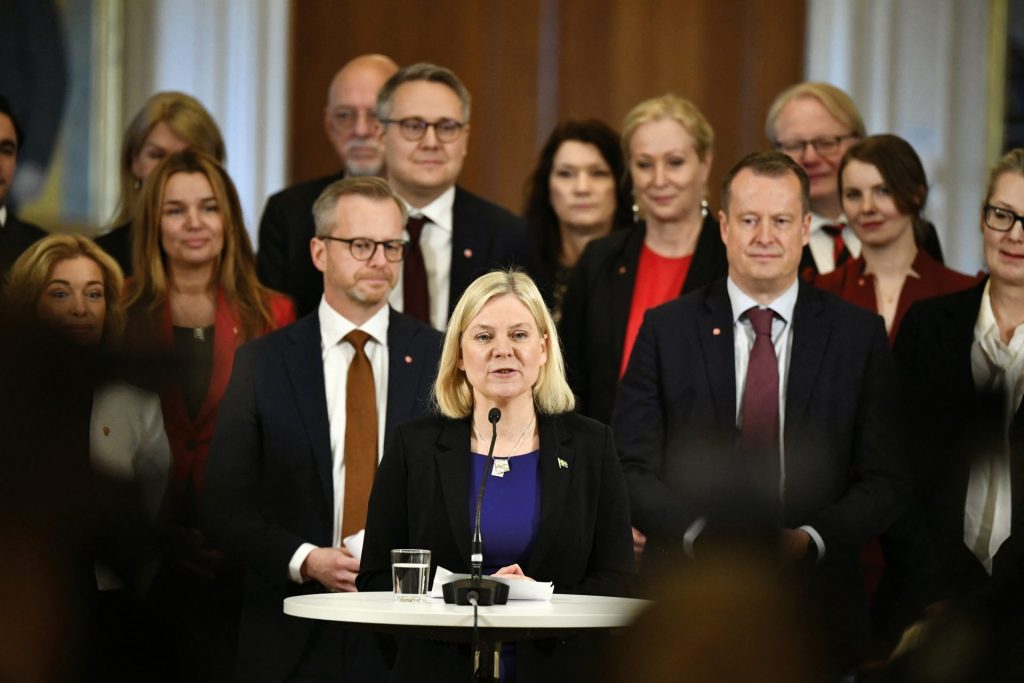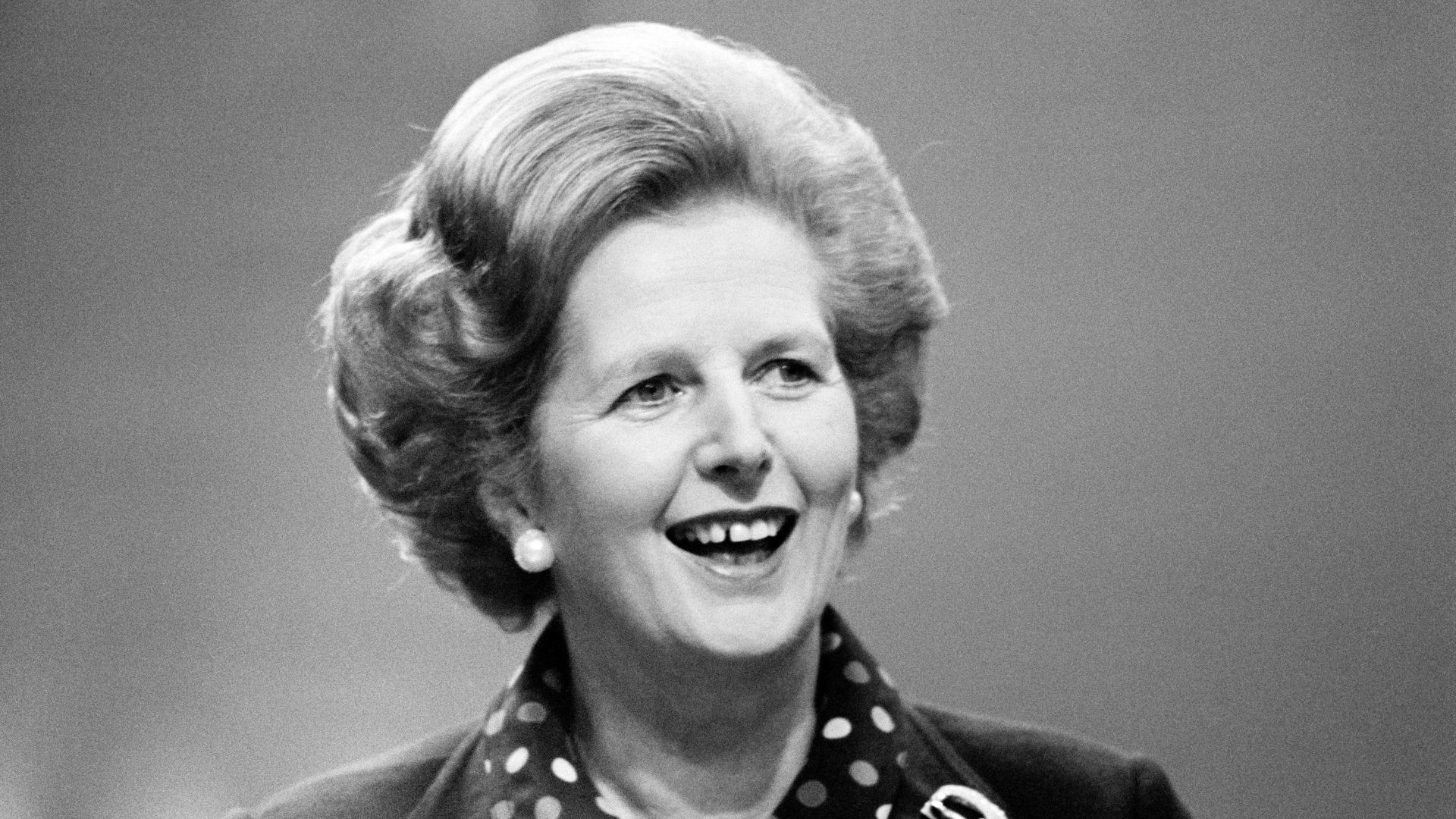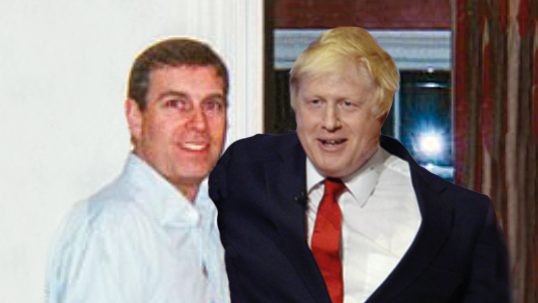In Britain, foreign secretary Liz Truss’s political star is in the ascendant as Boris Johnson’s falls. Conservative activists see her as the Cabinet minister most likely to succeed Johnson and she may make her move this year if his ratings continue to fall. She’ll run if he’s removed.
Across the Channel, a woman is rising in the polls ahead of the April 10 French presidential election. Valérie Pécresse, the first woman to run for president for the right-wing Les Républicains party of Charles de Gaulle and Jacques Chirac, is polling in second place behind Macron.
At one point, data even suggested Pécresse was narrowing the president’s lead and would defeat him in the run-off round on Sunday, April 24. The latest poll showed them tied.
Both Pécresse and Truss may be benefitting from what research shows are typical perceptions of female leaders. In recent years, multiple studies have shown that women at the helm of political parties are perceived to be more moderate, more sensitive and less bound by rigid ideology than their male counterparts.
Yet as Sarah Childs, professor of gender and politics at Bristol University, has noted, generalisations about women in politics don’t hold true. “Often the story is: if we get more women in, society will be more feminist. They’ll make it nicer and more consensual, stop corruption and bring more peace,” she says.
“While that may be true, it also may not be. It depends on who the politicians are.”
For all the hype around them, neither Pécresse nor Truss appear to herald a particularly new or different kind of politics, one that brings an emollient, nurturing female touch to today’s fractious debates over national and cultural identity, global mobility and the swirls and eddies of globalisation.
Instead, both women explicitly invite comparison with the original Iron Lady, who famously sought neither female solidarity nor tried to promote female talent.
Pécresse has described herself as “two-thirds Angela Merkel and one-third Margaret Thatcher… my opponents call me the Iron Lady.”
Taking a hard line on the three I’s that dominate the French election campaign so far – immigration, integration, Islam – Pécresse proposes to toughen policing, combat Islamist extremism and set quotas on immigrants by country of origin and cut their social benefits. She has vowed to restore France’s pride, protect the French and “bring back authority” to the nation.
In late November, Truss climbed atop a British Army Challenger 2 tank close to the Russian border, in imitation of Thatcher’s 1986 head-scarfed tank ride in Germany, and was promptly dubbed Britain’s new Mrs T.
Truss, who cites Britain’s first woman prime minister as an inspiration, vehemently rejects ‘identity politics’, which she defines as “the idea that you should have different policies for women and men”.
In early December, she urged Britain to resist national introspection and, instead, proudly embrace “our history, warts and all… Britain is the greatest country on Earth”.
This is tub-thumping talk, a muscular engagement with hot-button issues. One might have thought that female politicians in gender-conscious Europe would take a different, softer tack, thereby changing the parameters of the national conversation. That they aren’t, should give pause for thought on the old debate: Do women make better leaders?
One of the best test cases to gauge the effects of gender-equal policies on a country’s politics may be Sweden.
The Swedes have pursued a feminist foreign policy for seven years, the first country in the world to do so proudly and explicitly. As then-foreign minister Margot Wallstrom told the New Yorker in 2015, the intention is to stand “against the systematic and global subordination of women.”
Sweden focuses on three Rs – rights, representation and resources; promoting women’s issues and countering gender-based discrimination and violence, supporting female participation in decision-making and ensuring a fair allocation of resources among people of all genders.
The policy, which allows the Swedes to make demands of potential trade partners and funding recipients, is part of a wider gender equality policy the country has developed over the past half-century.
In 2020, Sweden’s Gender Equality Index score – based on metrics developed by a European Union-funded body, the European Institute for Gender Equality – was 83.8, the highest in the EU. The World Economic Forum’s 2021 Global Gender Gap Report, which benchmarks progress towards gender parity, ranks Sweden fifth out of 156 countries. And Sweden’s gender equality law came into force in 1979, a transformational decade for the country, when parental law replaced maternity leave along with other key social reforms.

And yet, Swedish politics appears irredeemably muscular at this point of time, so much so that in late November Magdalena Andersson, its first female prime minister, was forced to resign within hours of being voted into the job after a budget proposal she developed alongside the country’s Greens was rejected by parliament, which backed a more stringent economic plan drawn up by opposition parties instead.
She got her position back a week later but only precariously – by a two-vote parliamentary margin – and very temporarily. Just nine months remain until Sweden’s general election and Andersson’s minority government comprising her Social Democrat party has already been dismissed by the leader of the main right-wing opposition Moderates, as a “caretaker”. In weary acknowledgement of her country’s divisive political landscape and increasingly fragmented legislature, Andersson said after the vote, “Someone has to be prime minister in this country. There seem to be no alternatives.”
Sweden’s push for equality has had some success in terms of representation in parliament. More than half the cabinet of Andersson’s predecessor, Stefan Lofven, were women. Of the eight political parties currently represented in the Riksdag, only the newbie nationalist Sweden Democrats has never had a female leader.
Just two of the eight parties – the Sweden Democrats and the Moderate Party – are currently led by men. Clearly, Sweden’s long-held push for gender equality has seen results in frontline politics. And with Andersson it has achieved the ultimate goal, becoming the last Nordic country to have a female prime minister, albeit 40 years after Norway.
Even so, for all its focus on women and gender-equal ways of being, Swedish politics does not seem particularly distinctive compared with other European countries. Like Germany, led for the past 16 years by a woman, but making no pretence of gender equality in everything, Sweden has seen the rise of angry right-wing populists. Just as in neighbouring Denmark, Norway and Finland, Swedish politics is affected by the growing presence of the anti-immigrant Sweden Democrats.
There is new uncertainty about Sweden’s traditional two-horse race between the centre-right and the left-leaning bloc, which is turning the coalition government-building process into a fractious fight. Swedish political discourse is running hot and while it was once “a moral superpower,” in the words of Swedish historian Lars Tragardh, Sweden now seems willing to indulge its coarser instincts.
The question, once again, is why? Why is Sweden, which recently ranked first in a US survey of the “best countries for women”, just as hospitable as less gender-equal EU countries to the right wing populist trend of hostility to immigration, anti-elite rhetoric, cultural conservatism and ultra-nationalism?
One might have thought that the consensus-building mindset that is said to be a speciality of women politicians would help.
With her refreshingly humbug-free scientist’s approach, Angela Merkel put the issue of gender and leadership in context at her last engagement as German chancellor with a Berlin journalists’ union in late July. “Tendentially, I think there is a certain longing for efficiency among women,” she said. “But there are also exceptions. There are different men and there are different women (and it is) very difficult to determine characteristics.”
Even so, a research paper published last January by two female economists tried to determine if women leaders had been more effective during the pandemic.
Their initial analysis was encouraging for women. As leaders, the paper said, women “were less willing to take risks with lives but were more willing to accept risks in relation to the early lockdown of economies”. It added that women oversaw Covid outcomes that were “systematically and significantly better” and adopted “proactive policy responses”.
But the researchers themselves describe the study as only a ‘starting point’ in a larger discussion and they acknowledge the small sample size – only 19 of the 194 countries in the data set were led by women.
Some critics say the study’s conclusions should not be seen as anything more than an echo chamber for the buzzy belief that putting a woman in charge means everything will improve. Others point to a 2019 study which showed that, while voters perceived female leaders to be more moderate than men, charting their actual manifesto positions on a spectrum from left to right showed women-helmed parties were slightly more extreme than those with men at the top.
The most glittering stars in the firmament of current female political leaders include New Zealand’s Jacinda Ardern, Taiwan’s Tsai Ing-wen and Finland’s Sanna Marin. There is also Ursula von der Leyen, the European Commission’s first female president.
A trained doctor, with a master’s in public health, she might have been expected to be a superstar leader in a health crisis, but distinguished herself instead by her misjudgments. Von der Leyen got into a row with drug manufacturers over Covid-19 vaccine doses and initially presided over such a vaccine roll-out that Germany’s then finance minister Olaf Scholz reportedly described her commission’s strategy as a “total s***show”.
It would be bad news for the bracing theory that female leadership is a panacea, except that Von der Leyen’s gender can hardly be blamed for her missteps. Just as Barbados prime minister Mia Mottley’s two X chromosomes can’t be credited for the decisiveness with which she pushed through her island nation’s transformation into a republic after decades of politicians dithering over the idea.
Gender is also not behind the decision by Samia Suluhu Hassan, Tanzania’s first female president, to reverse her predecessor’s Covid-sceptic policy within months of taking office. Or Ardern’s competence in managing an effective response to a series of horrific events – the March
2019 Christchurch terrorist attacks, the White Island volcano eruption later that year, and the pandemic.
That said, Ardern’s charmed political life – dubbed Jacinderella by The Economist after she led her Labour party to an historic victory in October 2020 – is often partly ascribed to her womanly instincts. Or at least her decision to not behave like a man.
After Christchurch, Ardern was said to have been ‘exemplary’ in her empathetic response, donning a hijab and physically embracing members of the grieving Muslim community. It led Alison Pullen, a professor of management at Sydney’s Macquarie Business School, to publish a laudatory article in the Journal of Business Ethics.
“This isn’t about femininity,” she wrote, “this is about not behaving in keeping with the expectations of traditional masculine leadership.”
But compassion is not the sole preserve of women leaders. President Barack Obama publicly wept when he announced executive action on gun control and mentioned the 20 children who died in the 2012 shooting at Sandy Hook Elementary School. When Canada’s Justin Trudeau welcomed 163 Syrian refugees into his country in 2015, he helped a little child into a new coat, a gesture that some saw as emotionally aware, almost maternal.
And then there are the female leaders who don’t display much emotion or empathy. As prime minister, Theresa May’s response to Grenfell was seen as cold because she never thought to comfort the bereaved. While the Rohingya Muslims fled in the hundreds of thousands from Myanmar, its then leader Aung San Suu Kyi never once expressed sympathy for their plight.
Marine le Pen, leader of France’s anti-immigrant National Rally, is always pretty flinty about her hardline approach to immigration, no matter that she was outdone at the same game by Eric Zemmour, a man, and now by Pécresse.
Women do have different skill sets from men, perhaps because of their biological destiny as the bearers (and mostly) carers of children. However, that doesn’t mean all women (and all women leaders) are compassionate and selfless. Or that Margot Wallstrom, architect of Sweden’s feminist foreign policy is right to say, “More women means more peace.”
Women can be peacemakers or, like Thatcher, lead their country to war. A female leader can be very competent, moderately competent, or plain incompetent. In fact, women are sometimes excellent, other times passable or bad – just like men.




